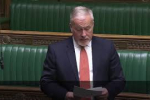
This week, the House of Commons has been debating the remaining stages of the Levelling Up and Regeneration Bill. The Bill would make a range of legislative changes associated with the government’s “levelling up” agenda, which intends to reduce geographical, economic, social and health inequalities. Richard has tabled and supported a number of amendments to the Bill.
Richard Fuller MP said:
The pace of housing development and the consequential pressure on access to public services is one of the most important and frequent issues raised with me by constituents.
This week we have been debating the details of the Levelling Up and Regeneration Bill which is the best opportunity for me to press for some of the changes I have discussed with Parish Councils, Local Authority Councillors and residents over the past two or so years.
The people of Bedfordshire are not against new housing – indeed we are doing our fair share and a lot more besides. In recent years, new housing builds have been between three and five times the national average.
What local people most want is greater local control over the siting of new developments, an avoidance of too rapid growth and, most of all, improvements to public services, such as GPs and school places, BEFORE additional large scale housing developments. I am seeking changes to the Bill to achieve these ends.
Through these amendments, Richard aims to achieve six goals:
- To remove top-down national targets that put additional pressures on our local authorities to build more houses than they believe are needed
- To close the loopholes that “creepy” developers use to get round delays in Local Plans to secure unwanted development approvals
- To strengthen the relative power for Neighbourhood Plans so crucial decisions can be made at the most local level
- To include goals regarding net zero, biodiversity and recycling in Neighbourhood Plans
- To provide assistance, via regulation, for listed buildings that wish to insulate or make other changes to make their properties consistent with Net Zero goals, and
- To implement Infrastructure First – a manifesto commitment that would improve access to local services
To achieve his first goal and slow the pace of development, Richard has put his name to New Clause 21 which will stop the national government from imposing mandatory targets making them advisory only and will abolish the five-year land supply rule which extends the top-down targets.
Richard said:
The rate of new housing development in North East Bedfordshire has been higher than the national average for many years. Many people are attracted here for the local environment, village and towns life or for ease of commute to London, Cambridge or other centres. Our local authorities – Central Bedfordshire Council and Bedford Borough Council – are already aware of these demands and do not need the national government to impose their own targets.
To secure his second goal and ensure developers play by the rules, Richard has submitted Amendment 75 to the Bill which would provide a legal basis for a Local Authority to defer any decision on a planning application during this period meaning that any such application would have to comply with the requirements of the new Local Plan. Richard has also added his name to New Clause 25 which introduces a “character test” that would take account of an applicant’s “previous compliance with planning rules and conditions, their record of engagement with planning authorities and delivery of developments, and accounting for whether they have made multiple, repetitive applications.” Richard has also supported amendments that will impose deadlines (New Clause 28), taxes (New Clause 30) and penalties (New Clause 29) on developers who gain planning approval for housebuilding but then fail to act
Richard said:
Good people play by the rules – not just the letter but also the spirit of the rules. Right at the start of becoming MP for North East Bedfordshire, I was made aware of a loophole in planning law that was being exploited by developers to obtain permission for development not wanted by local people. Led by local Councillor Alison Field Foster, local people and their Parish Council prevailed in that particular case, but it cost the local authority hundreds of thousands of pounds to take their case to the Planning Inspectorate.
I vowed then to seek to close the loophole that had been open to exploitation: the time delay between the date a Local Plan being submitted for independent inspection and the date a Local Plan has been adopted and therefore has legal force.
To strengthen local voices via Neighbourhood Plans and meet the third goal, Richard has tabled an amendment that would in effect give Neighbourhood Plans the final say in any dispute with the Local Authorities own Local Plan on important matters such as the specific location for any new housing development or the type of housing that can be built.
Richard added:
As I have visited the more than fifty Parishes in my constituency, I have been impressed by the level of effort, involvement and detail that has been devoted by many to create their Neighbourhood Plan. A Neighbourhood Plan is where people get a say in how their local community develops. Such Plans are not an unqualified success. They can be expensive to complete; it can be difficult to get people to engage so that plans truly reflect all opinions; and final decision can still be divisive. Nevertheless I am a strong believer that decisions on these matters should be made at the most local level.
Many residents have complained to me that developers are too keen on building large – often expensive – houses that are not suited to purchase by local people. By giving Neighbourhood Plans final say on such matters I think we will generate more support for building the houses that local people feel is needed and in the places they deem most suitable.
To meet the fourth goal and promote our local environment to meet the Net Zero challenge, Richrd has tabled Amendment 74 that would require Neighbourhood Plans to include consideration of three issues important to our natural environment: achieving Net Zero; promoting and increasing local biodiversity; and improving levels of recycling. Richard has also added his name to New Clause 38 that places a new requirement on planning authorities to “have regard to any potential impacts of that policy on the resilience of UK agriculture, agricultural land and domestic food production, and seeking to minimise any adverse such impacts so far as is reasonably practicable.” Many residents have raised their concerns that farmland across Bedfordshire is being sacrificed too easily for housing. This amendment would seek a better balance between short term gains from new house building with our long term needs for food security.
To achieve his fifth goal, Richard has also tabled New Clause 87, which places a requirement on the Secretary of State to make regulations that “make it easier for owners of residential listed buildings to improve the energy efficiency of those buildings” and, importantly, places requirements on Historic England to be supportive in these efforts by residents.
Richard said:
My constituents will know that I am very concerned that Parliament has set a legal requirement to achieve Net Zero without properly assessing the potential cost to taxpayers and consumers. I am concerned too that the technologies we need are still evolving and that lowering the overall costs may take action on a community level rather than an individual level. For example, charging points for electric vehicles or decarbonising home heating.
At my local surgery sessions, I have met residents living in listed buildings who are really concerned at the restrictions that stop them insulating their homes or making other changes that might be needed to comply with future legislation, so I
The 2019 Conservative Manifesto included the proposal for “Infrastructure First”. This proposal would require developers of large-scale housing developments to build the schools, GP surgeries and other important local services infrastructure BEFORE they could commence housebuilding. Richard has tabled an amendment to relieve pressures on local services caused by high levels of housebuilding.
Richard Fuller said:
During my review of local GP services, I was shocked to find how long delayed new service provision has been: from the new GP building in Biddenham to primary school provision in Stotfold.
Annoyingly, the government has not yet found time to implement the Infrastructure First proposal, so my amendment seeks to provide a statutory requirement that this is done. I shall not stop my efforts to persuade the government to review the historical deficiency in local services we now face in Bedfordshire due to two decades of rapid house building, but it will “draw a line in the concrete” for any future large developments.

